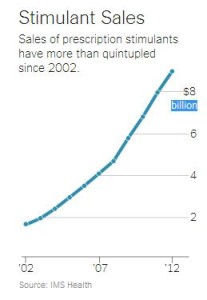
More than 10 percent of kids aged 4 – 17 have been diagnosed as ADHD, according to a release from the Centers for Disease Control and Prevention (CDC). Nearly 70 percent of kids diagnosed with ADHD are reportedly on medication. The total number of kids taking these drugs has increased more than five-fold in the past 20 years or so.
Many critics of the establishment have pointed out that the increase in ADHD diagnoses has gone hand-in-hand with marketing efforts by drug companies to sell their medications as treatments. The category has gone from addressing children with serious difficulty to being a catch-all for any kind of non-cooperation among kids.
Some of these critics have even come from within the medical field, as pointed out in a recent New York Times article.
The story quoted Dr. Keith Conners as saying, “The numbers make it look like an epidemic. Well, it’s not. It’s preposterous. This is a concoction to justify the giving out of medication at unprecedented and unjustifiable levels.” Dr. Conners is a psychologist and professor emeritus at Duke University.
As the graphic from IMS Health shows here, revenue from prescription stimulants has more than quadrupled just in the last decade.
All of these amphetamines hitting the market, and people growing up on them, has sparked an increase in the number of people needing help to stop their use. Drug rehabilitation centers throughout the country have reported a rise in the number people seeking treatment for a dependency on drugs such as Ritalin and Adderall. In addition, these medications have become new “gateway drugs,” leading teenagers to then try more substances afterward.
At Gulf Breeze Recovery, we realize there are times and places for prescriptions and they can be extremely helpful, even life-saving, when used properly. However, we encourage parents to become as educated as possible and seek second opinions about ADHD diagnoses and medications. It is okay to find a doctor that is willing to work with you on alternative treatments first, such as diet, exercise, outdoor activities and other therapies that can help with the symptoms and don’t carry the possible side effect of addiction.
If you already have a loved one addicted to a prescription stimulant, or any other kind of drug, contact us today for information about our effective rehabilitation program.






